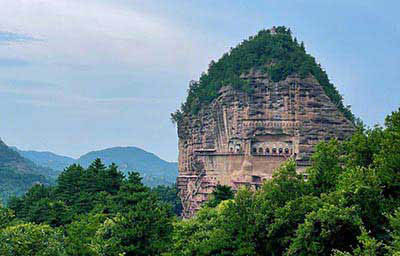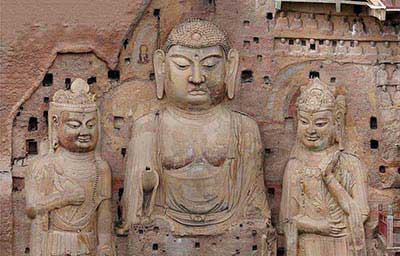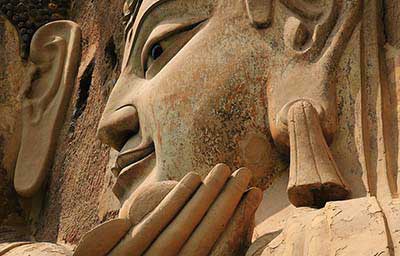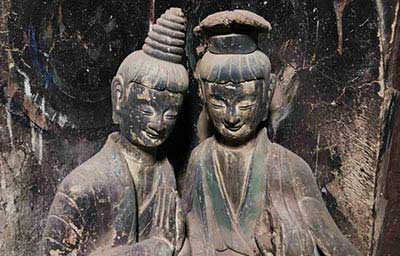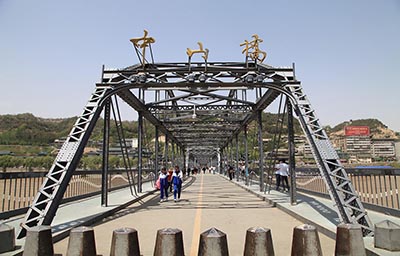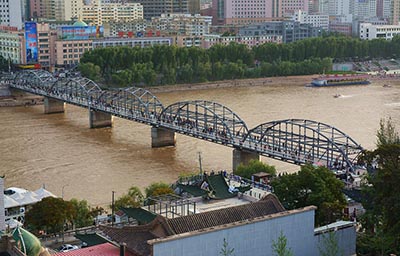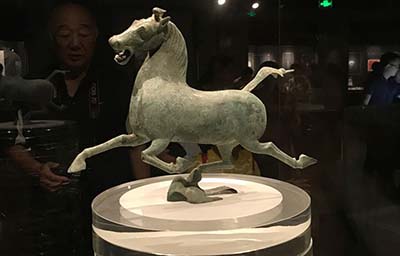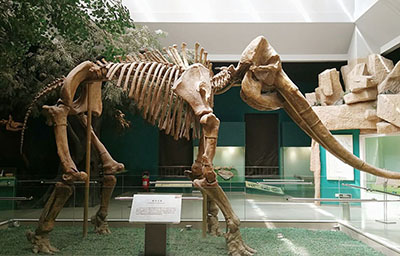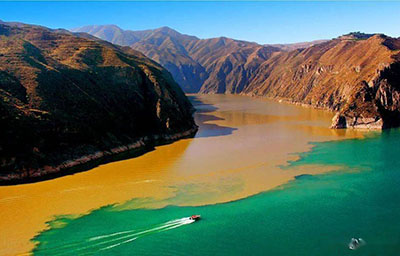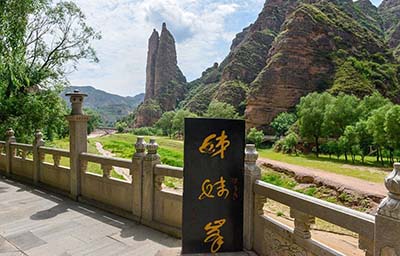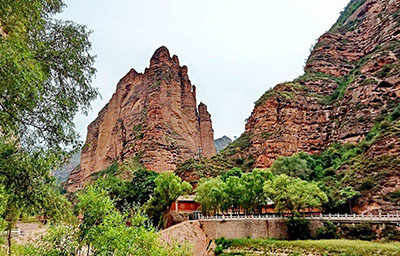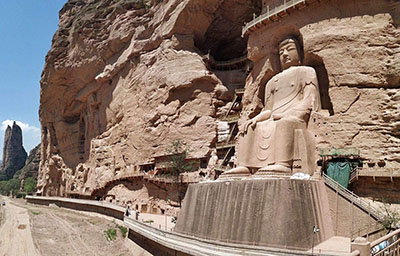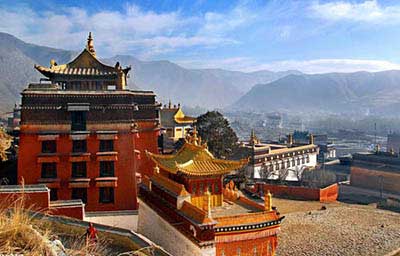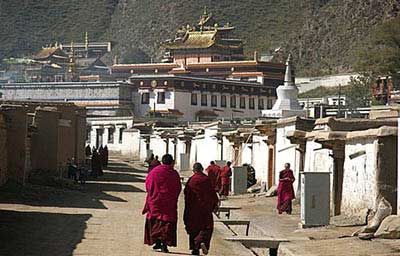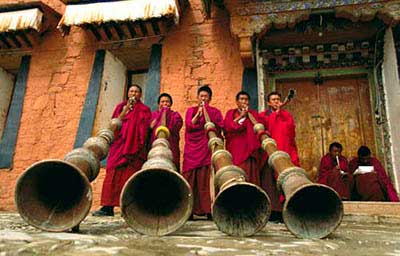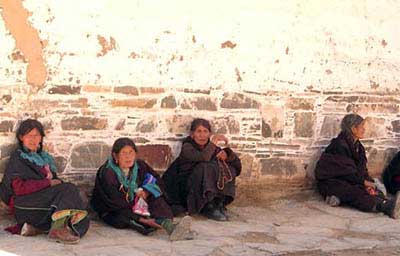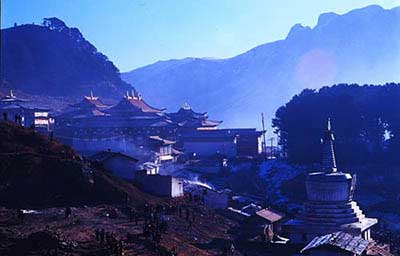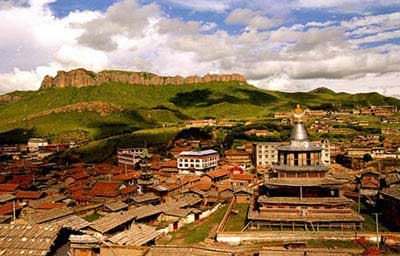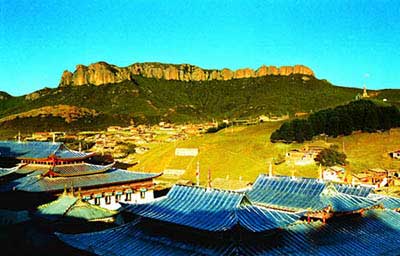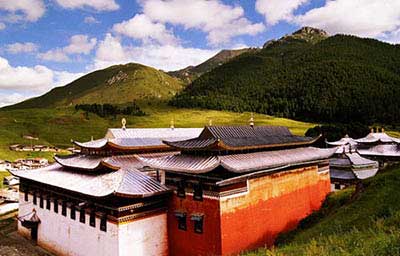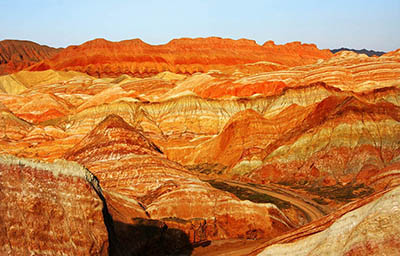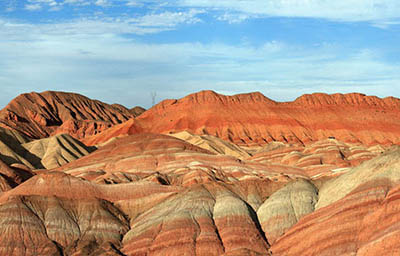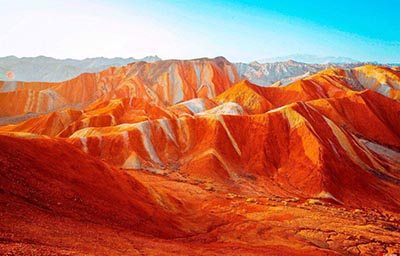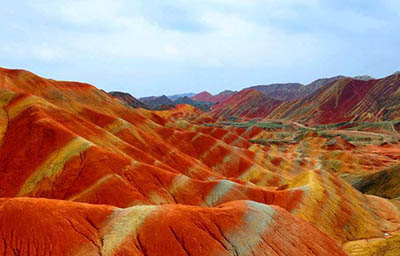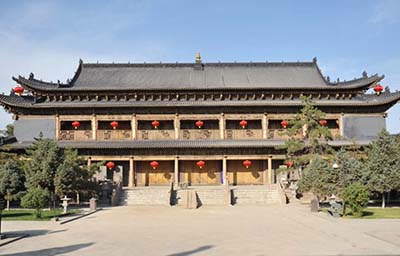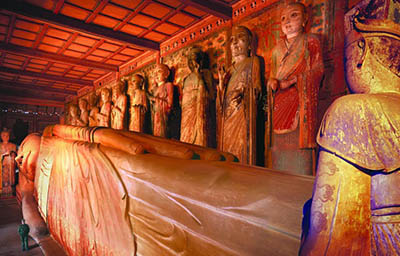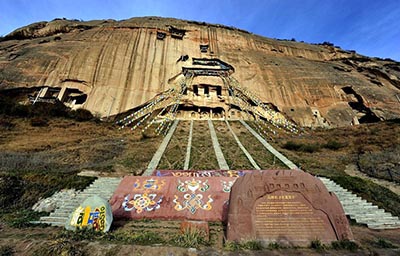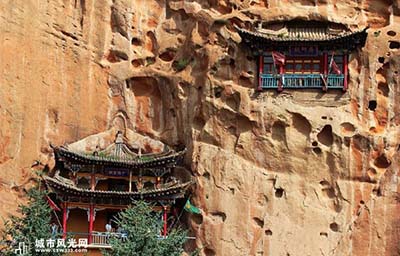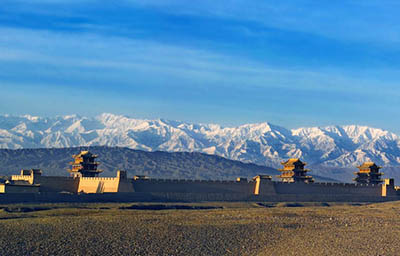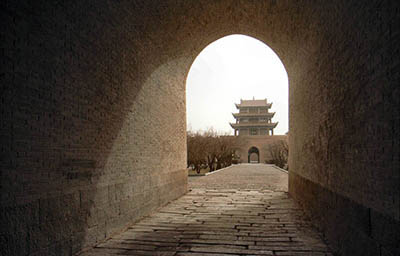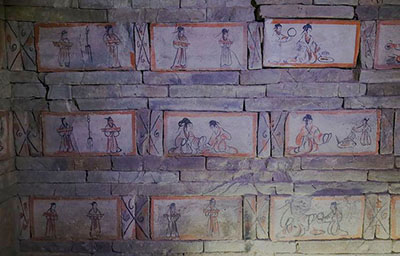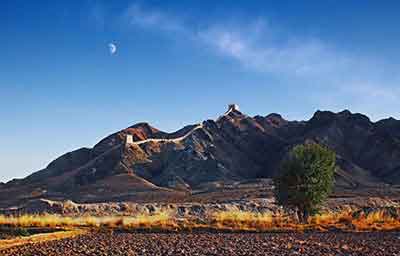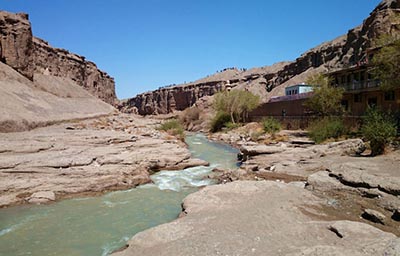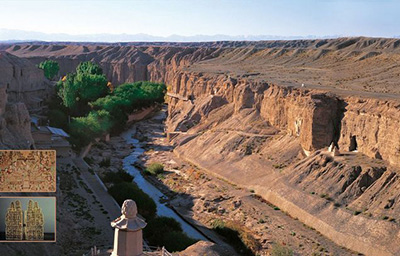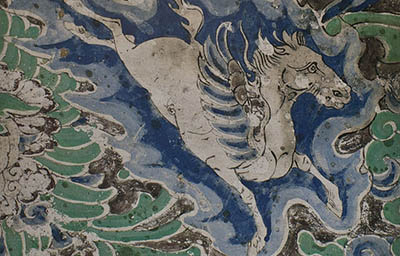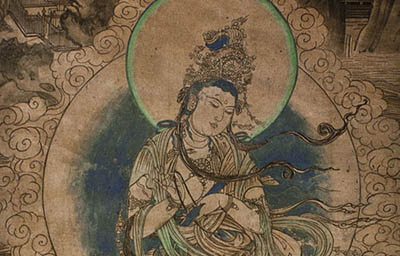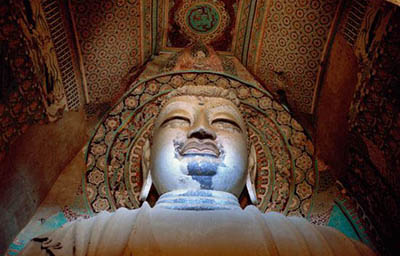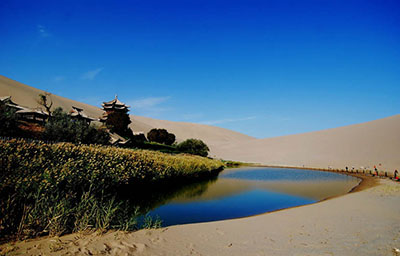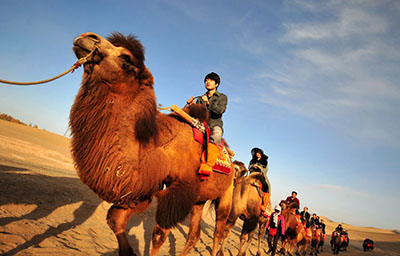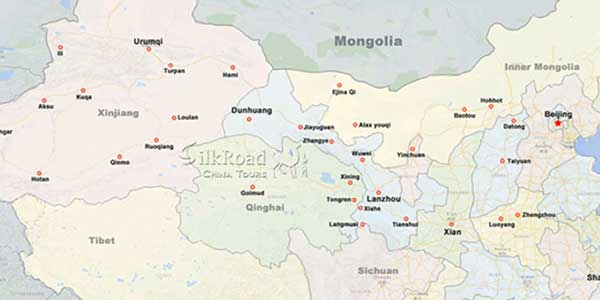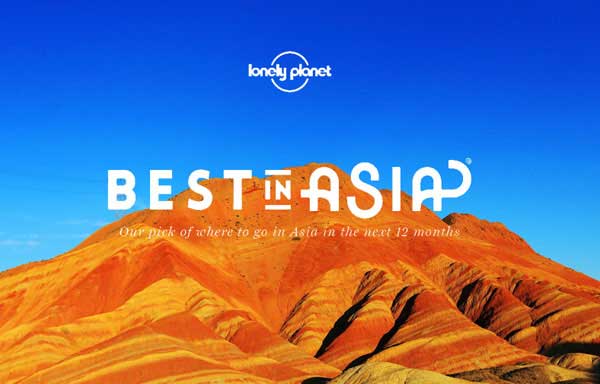
12 Days Gansu Highlights Tour
Tour Type: Private tour
Tour Price: From *** Note!
Destinations: Xian – Tianshui – Lanzhou – Xiahe – Langmusi – Hezuo – Zhangye – Jiayuguan - Dunhuang
Free Inquiry Get a free quotation.Day 1
- Arrival Xian
- Meals: No
- Accommodation: In Xian
Arrival at Xian and be transferred to hotel.
Xi'an is the regional capital of Shaanxi, the largest city in north-west China. It had served as the nation's capital for more than 1000 years, which combine ancient China capital culture with amazing historical relics.
Xian is one of the most important birthplaces of the Chinese civilization and the Chinese nation, as well as the beginning of the Silk Road. 13 dynasties have established their capitals here in history.
Day 2
- Xian Tianshui
- Meals: Breakfast, Lunch
- Accommodation: In Tianshui
After breakfast, take speed train to Tianshui (1 hour and 40 minutes).On arrival be picked up by our guide and driver, and then visit Maijishan Grottoes. Maijishan Grottoes is one of China’s four greatest Buddhist grottoes, which is also known as “Oriental Sculpture Museum”.
Tianshui is the second largest city in Gansu Province in northwest China,which extends across the Yangtze River and the Yellow River systems. It is on the route of the ancient Silk Road. The city was named by the legend of the "Tianhe River Infusion." In myths, Tianshui was the birthplace of Fuxi, the earliest Chinese ancestor.
Maijishan Grottoes is one of the “Four Great Grottoes" in China. The caves were excavated into Maijishan Mountain which is 150 meters tall, and named for its shape — like that of a pile of wheat. It has 10,632 clay sculptures and is praised as "the Oriental Sculpture Art Exhibition Hall".
Day 3
- Tianshui Lanzhou
- Meals: Breakfast, Lunch
- Accommodation: In Lanzhou
After breakfast, take speed train to Lanzhou (1.5 hours). On arrival be picked up by our guide and driver and then visit The Zhongshan Bridge on Yellow river and Gansu Museum - one of the best Museums on Silk Road.
The Zhongshan Bridge located at the northern part of downtown Lanzhou. Dubbed "the First Bridge across the Yellow River," it has become one of the city's landmarks. In 1907, engineers from Belgium, Germany and the U.S., together with local workers, jointly built the sturdy and durable iron bridge. In honor of Sun Yat-sen (1866-1925), a great Chinese revolutionary.
Gansu Provincial Museum Located in Lanzhou City, on the banks of the Yellow River, is an integrative local history museum renowned at home and abroad for unique artifacts and painted pottery from the Neolithic Age, fossils of ancient creatures, wooden and bamboo strips from the Han Dynasty (206BC-220AD), documents, Silk Road treasures from the Han to the Tang Dynasties (618-907),and Buddhist artworks.
Day 4
- Lanzhou Xiahe
- Meals: Breakfast, Lunch
- Accommodation: In Xiahe
After breakfast, drive to Liujiuxia Reservoir – one of the earliest and most important hydropower stations of China. Take a speed boat from the huge dam of Liujiaxia to Binglingsi grottoes. After sightseeing take speed boat back the dam and drive 150km to Xiahe city.
Xiahe City is located in southern Gansu Province, about 280km from capital city Lanzhou. It’s a component part of Amdo Tibetan Region. Xiahe is named after the Xiahe River and has different landscapes ranging from towering mountains, valleys, grasslands and forests. The profound Tibetan Buddhism and various custom activities are also highlights of Xiahe.
Binglingsi Grottoes is a series of grottoes filled with Buddhist sculpture carved into natural caves and caverns in a canyon along the Yellow River. It lies just north of where the Yellow River empties into the Liujiaxia Reservoir. It is both stylistically and geographically a midpoint between the monumental Buddhas of Bamiyan in Afghanistan and the Buddhist Grottoes of central China, Yungang Grottoes near Datong and Longmen Grottoes near Luoyang. The site is extremely remote and can only be reached during summer and fall by boat via the Liujiaxia Reservoir.
Day 5
- Xiahe Langmusi
- Meals: Breakfast, Lunch
- Accommodation: In Langmusi
After breakfast, follow Tibetan pilgrims to see the longest prayer wheel corridor of the world and then visit Labrang Monastery – the largest Tibetan Buddhism College of the world. After lunch, drive about 185km to Langmusi and check in hotel.
Labrang Monastery is one of six major monasteries of Gelugpa (Yellow Hat Sect) of Tibetan Buddhism, which is now the most important religious and cultural activity center for Tibetan outside Tibet Autonomous Region. It boasts the best Tibetan Buddhism system and is hailed as the world’s institution of Tibetology. It is reported to have 108 smaller monasteries affiliated with Labrang Monastery in history.
Langmusi is nested on the remote eastern edge of China’s Qinghai Plateau, at an altitude of 3600 meters and shared by Gansu Province and Sichuan Province. The town was built and developed around the Langmu Temple (founded in 1748), hence the name Langmusi Town. For centuries, this serene, legendary town has been inhabited by Hui Muslims and Amdo Tibetans, who live together peacefully and stick to their respective beliefs.
Day 6
- Langmusi Hezuo
- Meals: Breakfast, Lunch
- Accommodation: In Hezuo
After breakfast, visit Sertri Gompa monastery on Gansu side and Kirti Gompa monastery on Sichuan side. After lunch stroll about the small city and then drive about 170km to Hezuo city.
Sertri Gompa monastery simply referred to as the Gansu Monastery, with golden- and silver-roofed halls dates from 1748 and stands on the Gansu side of White Dragon River. The views are lovely from the uppermost temple building, looking back down into Langmusi town and along the White Dragon River.
Kirti Gompa monastery rising up on the Sichuan side of White Dragon River , referred to as the Sichuan Monastery – built in 1413, home to around 700 monks and composed of six temples and colleges. Try catching a glimpse of student monks in class by visiting the monastery in the morning and late afternoon.
Day 7
- Hezuo Lanzhou Zhangye
- Meals: Breakfast, Lunch
- Accommodation: In Zhangye
After breakfast, drive about 230km to Lanzhou city and take speed train to Zhangye (3 hours). On arrival, drive 60km to visit Danxia Landform (sunset). Zhangye Danxia Landform is also known as Rainbow Mountains, which is one of the most beautiful Danxia Landform of the world.
Zhangye located in the middle of Hexi Corridor, literally meaning “to extend arms”, which was named after a Chinese old saying “Extend the arm of the country, lead the way to Western Realm”. Zhangye is a key town of the Silk Road, the major thoroughfare of New Eurasian Land Bridge and national historical and cultural city. Black River, the second largest river inland river of Northwest China, running through Zhangye makes Zhangye the commodity grain base of Gansu Province.
Zhangye Danxia landform is also known as the eye candy of Zhangye. Many artists admire this masterpiece as it appears like a perfect painting on canvas. This 400-square-kilometer attraction is located 45km south-west of Zhangye city. It is composed of lots of precipitous cliffs, most of which are several hundred meters high. All of these cliffs are smooth and sharp, standing in the plains and riversides, looking grand and magnificent, vigorous and virile. Even the low pinnacles look powerful.
Day 8
- Zhangye
- Meals: Breakfast, Lunch
- Accommodation: In Zhangye
After breakfast, visit Giant Buddha temple. Giant Buddha Temple is the only Western Xia dynasty royal temple preserved in China, which houses the largest clay reclining Buddha of Asia. After lunch drive about 70km to visit Matisi Grottoes.
The Giant Buddha Temple was initially built in 1098 AD, which houses the biggest clay and wood reclining Buddha in Asia. It's also the only preserved Western Xia Royal temple in China.
Matisi Grottoes is also known as the Horse’s Hoof Temple. It is a very popular scenic spot which integrates Yugu minority group’s folk customs, snow mountain views and Buddhist art. The temple received its name due to the legend that a heavenly horse had landed in the area and had left a large horseshoe imprint which can be seen even today in the Mati Hall.
Day 9
- Zhangye Jiayuguan
- Meals: Breakfast, Lunch
- Accommodation: In Jiayuguan
After breakfast, drive about 230km to Jiayuguan city and visit the famous underground art gallery - Wei-jin tomb and the western end of the Great wall - Jiayuguan Pass and overhanging great wall. Then check in the hotel.
Jiayuguan Pass stands in the southwest part of Jiayuguan City, about 6 km away from downtown. The castle was begun in 1372 in the Ming Dynasty and located in the Jiayu Highland, hence its name Jiayuguan Pass. Jaiyuguan is the most western end of the Great Wall. Also known as "the First and Greatest Pass under Heaven", Jiayuguan Pass is the best preserved and most magnificent military building among the passes of the Great Wall. It was a key passageway of the ancient Silk Road. It commands fascinating views of the boundless Gobi Desert and the snow-capped Qilian Mountains.
Wei-Jin tomb is located 20 kilometers northeast of Jiayuguan city. The tomb dates from approximately AD 220–420 (the Wei and Western Jin periods) and contain extraordinarily fresh brick-wall paintings depicting scenes of everyday life, from making tea to picking mulberries for silk production, grazing, farming, sericulture, hunting, slaughtering, gaming, dancing, drinking and so on, which are precious and visual materials for reaching the husbandry of Wei and Jin Dynasty.
Overhanging Great Wall lies to the north of Jiayuguan pass, this section of the Great Wall is believed to have been first constructed in 1539. It’s a reasonably energetic hike up the equivalent of 55 flights of stairs to excellent views of the desert, power stations and the distant, glittering snowcapped peaks from the watchtower at the top (which you can climb up).
Day 10
- Jiayuguan Dunhuang
- Meals: Breakfast, Lunch
- Accommodation: In Dunhuang
After breakfast, drive about 300km to Suoyang Town where to have lunch, and then drive 30km to visit Yulin grottoes. Yulin Grottoes is an important UNESCO site, which is famous for exquisite mural painting from Tang and Western Xia dynasties. Then drive 160km to Dunhuang and check in hotel.
Dunhuang is a fertile oasis town at western end of Gansu province, which has for millennia been a refuge for weary Silk Road travelers, leading the north and south route of Silk Road. It is at the far western limit of traditional Chinese settlement along the Silk Road across Central Asia.
Yulin Grottoes a brunch of the Dunhuang art complex and another name Ten-Thousand-Buddha Valley, are located in Qilian Mountain, southeast of the Mogao Grottoes. There are 41 major caves scattered around. Murals in these grottoes which consist of huge scripture drawings, portraits of Buddha etc. reveal the highly developed art of painting in the Tang Dynasty more than 1300 years ago. The Yulin Grottoes are highlighted by their delicate and colorful murals painted from various dynasties, whose content ranges from the figures of Buddha to the sutra stories to flowers and beasts.
Day 11
- Dunhuang
- Meals: Breakfast, Lunch
- Accommodation: In Dunhuang
After breakfast, drive 15km to visit Mogao Grottoes - the biggest Buddhist Art gallery of the world. After lunch, visit Singing Sand Dunes and Crescent Lake. In the evening stroll to the famous local night market.
Mogao Grottoes located on the eastern slope of Rattling Sand Mountain southeast of Dunhuang County, the Mogao Grottoes (also known as Thousand Buddha Cave) is one of three noted grottoes in China and also the largest, best preserved and richest treasure house of Buddhist art in the world.In AD 366, during the Eastern Jin Dynasty, a monk named Yue Seng chiseled the first cave here. The endeavor continued through later dynasties, resulting in the fantastic group of caves that can be seen today.
Singing Sand Dunes and Crescent Lake The Singing sand dune is known as one of the Eight Great Landscapes of Dunhuang and one of the Four Great Singing Sands of China. Completely piled by sands, the mountain stretches for 40 km in length and 20 km in width respectively, with the highest point reaching 250 meters. When there is wild wind, the sands will be blown up and make loud sound, while the sound sounds like being produced by some ancient musical instrument when blew by breeze, hence the name. The Crescent Lake is in a natural shape of half-moon and had been commonly considered as one of the Eight Great Landscapes of Dunhuang together with the Echoing-Sand Mountain. Crescent Lake extends for nearly 100 meters from south to north and about 25 meters from east to west and has a deepest point of approximately 5 meters. The lake is a natural wonder; it's totally enclosed by the sand dunes around, but never been buried by sand.
Day 12
- Dunhuang Departure
- Meals: Breakfast
- Accommodation: No
Be transferred to the airport and tour end.
Price Includes
- Private car with air-conditioning and driver
- Land transfers between airport / train station / hotels and scenic sites
- Hotel accommodation with breakfast (4 stars with nice breakfast)
- Professional English speaking tour guide
- Lunch and dinner as listed in the itinerary
- Speed train ticket from Xian to Tianshui
- Speed train ticket from Tianshui to Lanzhou
- Speed train ticket from Lanzhou to Zhangye
- Entrance fee as listed in the itinerary
- 24 H / 7D English speaking telephone service
- Government taxes
Price Excludes
- Personal expenses such as laundry, drinks, phone bills and optional activities …
- Gratitude for guides and drivers as international practice
- China Entry Visa
- Travel insurance (full coverage travel insurance from you country of origin)
Hotels
For all standard tours, The Silk Road China Tours will choose the best 4 stars hotel in different destinations. The hotel was evaluated comprehensively by its room size, cleanness, location, service and breakfast. It can well satisfy most western travelers and brings you relaxation, comfort and convenience.
If you want to upgrade the hotel to Deluxe standard or you have some special requirements, please inform us in the booking form or email us.
At some remote regions or ethnic area, there are no 4 stars or 5 stars hotels available. So we will arrange the best local hotel and notify the situation in advance.
Meals
Normally The Silk Road China Tours provides two meals each day: Breakfast and Lunch. You will have the freedom to make your own dinner choice.
Breakfast
It is normally served at the hotel where you stay. Depending on the hotel, the breakfast would be in western style, Chinese style, or a combination.
Lunch
When plan your lunches, we consider the balance of food quality, dining environment and tour convenience. We will provide lunch in a local restaurant whenever possible. The meal will give you an opportunity to eat at local restaurant, follow local customs, and taste local dishes. However in some remote regions where it’s simply hard to find a non-tourist restaurant, the meal could be arranged at a local tourist restaurant or a local family
Your own dinner choice
Dinners will not be included in your meal plan unless you have that requirement. Enjoying the local food could be one of your best experiences in China. This is why we provide you this flexibility of food choice. Your private guide will always give you good suggestions based on your preferences.
If you have certain food allergies or special requirements such as vegetarian food, let us know. We will do our best to accommodate your needs.
Private Guide & Transfer
You will have a private tour guide, private driver, and an air-conditioned vehicle escorting you at every destination you travel. This will provide you with maximized personal care, security, and flexibility.
All of our tour guides are qualified professionals and registered English Speaking Tourist Guides in China who are reassessed annually. All of our tour vehicles are clean and in excellent condition, manned with licensed safe drivers.
Private Tour Guide
You will always be greeted punctually on arrival at each destination airport. At every departure, your guide will stay at your side until you have checked in and passed through the security checkpoint.
All of our travel guides in every destination are locals, who know the area well, they are very good at guiding you around and telling background stories of the tour sites, as well as showing you the secret spots for taking your best photos.
When changing your itinerary is needed due to unexpected reasons, your private tour guides will be more than accommodating in suggesting alternatives to ensure that you have a wonderful experience.
Private Transportation
When plan your lunches, we consider the balance of food quality, dining environment and tour convenience. We will provide lunch in a local restaurant whenever possible. The meal will give you an opportunity to eat at local restaurant, follow local customs, and taste local dishes. However in some remote regions where it’s simply hard to find a non-tourist restaurant, the meal could be arranged at a local tourist restaurant or a local family
Your own dinner choice
With our comfortable and safe private transportation, your tour will be more relaxing and less tiresome, keeping you in the best spirits to make the most of your experience in China.
In every destination visited, your vehicle is air conditioned, clean, and expertly maintained. Your private driver is licensed, insured, and very experienced.
To maximize your comfort, we use vehicles with extra space for you and your luggage. Depending on how many are traveling together, we generally use sedans or mini vans (7 seats) for 4 people or less, large vans or small coaches (12-22 seats) for 5-12 people, medium coaches (33 – 37 seats) for 13 – 25 people, and large coaches (45 seats over) for more than 25 people.
Tipping Guidelines
We realize that tipping is a sensitive subject for all travelers. While tips are widely accepted, we would like to stress that this is at your own personal discretion.While everyone is recommended to tip based on services rendered, our clients often ask we provide some basic guidelines.
1 person: $20-30/day • Group of 2: $15-25/per person/day • Group of 3-5: $15/per person/day • Group of 6-10: $10/per person/day
Some outstanding guides receive twice or three times as much depending on service quality and also the size of the group. Guests are welcome to tip more if they feel the services were exceptional. The driver may sometimes receive a tip 50% of what the guide receives. In places where roads are rough and dangerous, the driver may sometimes receive an equal amount of tipping as the guide.
Why Choose Us?
We are the top Silk Road tour operator based in Dunhuang, China. We focus on providing well designed Silk Road China Tours with resonable price and thoughtful service.
- Easy & carefree booking
- The best value
- Great travel experience
- Locally operated
Tailor-made Tours

Your final trip plan will be 100% tailored to your needs, incl. itinerary, activities, hotel, meal plan etc.
Hot Tours
-
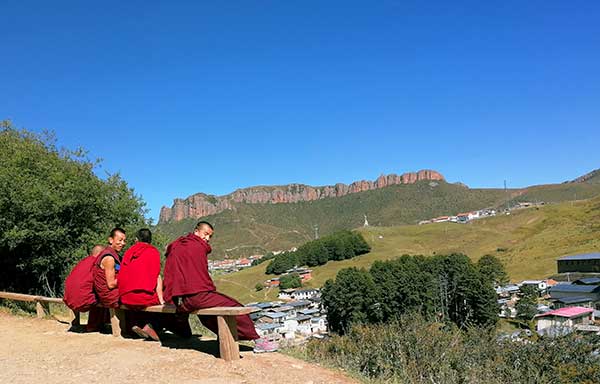
6 days Gansu tour to Binglingsi, Xiahe and Langmusi
Tour type : Private tour Price : from *** Destinations : Lanzhou - linxia - Xiahe - Langmusi - Hezuo - Lanzhou -

12 Days Gansu Highlights Tour
Tour type : Private tour Price : from *** Destinations : Xian – Tianshui – Lanzhou – Xiahe – Langmusi – Hezuo – Zhangye – Jiayuguan - Dunhuang -
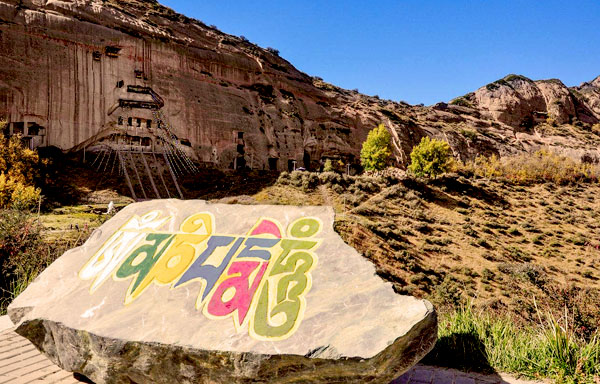
10 Days Silk Road Classic Tour
Tour type : Private tour Price : from *** Destinations : Xian - Zhangye - Jiayuguan - Dunhuang - Turpan - Urumqi -
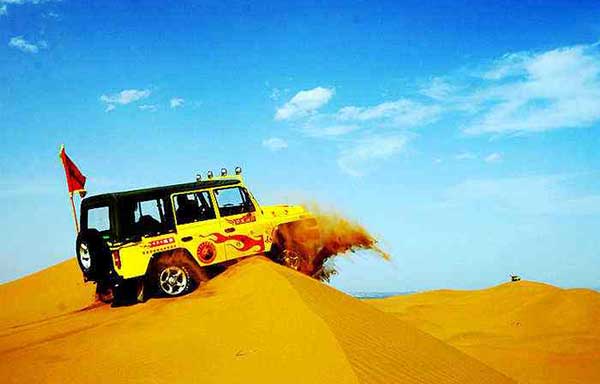
5 Days Zhangye - Alxa youqi Highlights Tour
Tour type : Private Tour Price : from *** Destinations : Zhangye - Alax youqi - Zhangye -
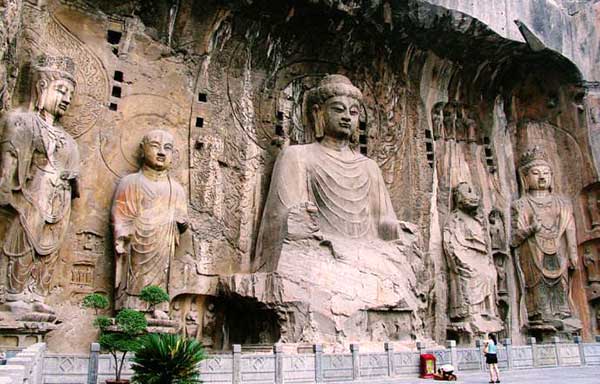
12 Days Silk Road Buddhist Art Tour
Tour type : Private tour Price : from *** Destinations : Beijing - Dunhuang - Jiayuguan - Zhangye - Lanzhou - Tianshui - Xian - Luoyang - Beijing -
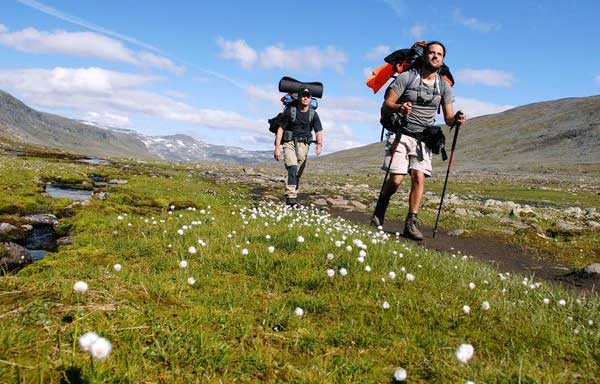
4 Days Zhangye Hiking Tour
Tour type : Hiking Tour Price : from **** Destinations : Zhangye

